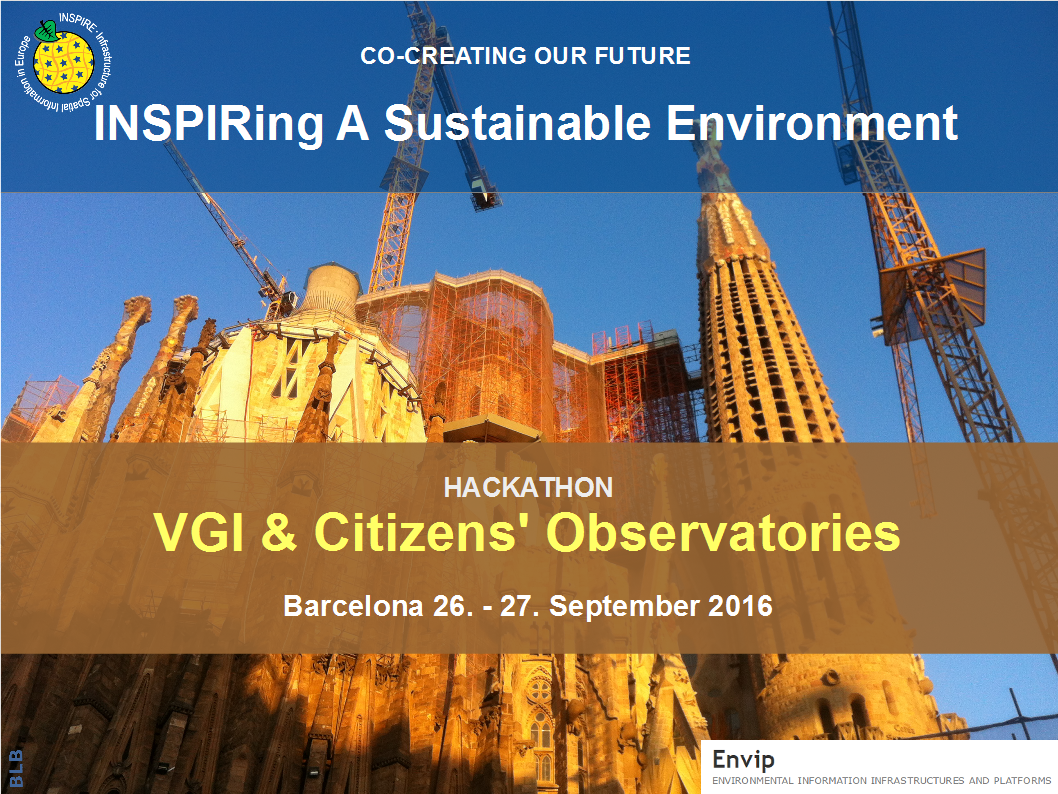Citizen Observatories
INSPIRE’2016
Barcelona, Monday September 26th – Wednesday September 28th, 2016
3 day program
Barcelona, Monday September 26th, 2016
(1100 – 1800)
VGI and Citizen Observatories INSPIRE Hack
Karel Charvat, Arne J. Berre, Tomas Mildorf, Bente Lilja Bye and Sven Schade
Abstract
Current society requires easy, reliable and quick access to environmental information published by various organizations and initiatives. The environment questions cover many activities that produce various sorts of data. They are connected with natural risks and hazards (e.g. floods, forest fires), pollution and contamination of air, soil or water, degradation of landscape (e.g. deforestation, erosion, slide processes), scientific research (ecology, geographical sciences), historical landscape memory (landscape ecological research), education and raising public awareness and business activities (e.g. eco-tourism, ecological farms, ecological food production). Local and community activities capture local knowledge in multimedia forms including videos, photos or oral histories. The collected information can contribute to up-to-date data. Volunteered geographic information (VGI) is the harnessing of tools to create, assemble, and disseminate geographic data provided voluntarily by individuals . In the context of voluntary data collection, an important part is the way how data are processed. An example can be Neogeography (New Age Geography) focused on combining geotagged data (e.g. KML ) with a map interface for contextualised exploration. In Neogeography data can be from volunteers (VGI) or from professionals and can be open or with restricted access. Neogeography is closely related to Application Programming Interfaces (APIs), Web 2.0 and mapping capabilities of the geospatial web. VGI and Citizens Observatories INSPIRE Hack will be the first hackathon combined with a INSPIRE conference with the aim to create the space, where those with the interest in the potential of VGI and Citizens Observatories can meet, present their tools and components from existing projects and discuss and explore how results, ideas and knowledge can be combined in possible ways for new projects and for new project ideas. VGI and Citizens Observatories INSPIRE Hack will run through the first three days of the INSPIRE conference. There might be an option also for continuing the hackathon for the last two days of the conference. The first session will present projects and tools dealing with VGI Information and Citizen Observatories namely: CITI-SENSE, COBWEB, WeSenseIt, SDI4Apps, Open Transport Net, FOODIE The second session will present new projects and project ideas for VGI and Citizens Observatories/Citizen Science – in particular: SCENT, Ground Truth 2.0, LandSense, GROW and potentially other ideas from the participants.
Detailed Workshop agenda – Monday September 26th
Meeting room H2
1100 – 1230: First block –Introduction to the new CO projects, and results from the existing projects
10 minutes Introduction – purpose of VGI and Citizen Observatories INSPIRE Hack Karel Charvat, Arne Berre, Tomas Mildorf, Bente Lilja Bye
10 minutes – Why is VGI and Citizen Observatories important for INSPIRE, Copernicus and GEOSS, Jose Miguel Rubio Iglesias, National Centre for Geographic Information (Spain), (prev. EU Commission)
Overview of the three challenge areas – Bente Lilja Bye – 1) User perspective results and effects (citizens, scientists, developers), 2) User side tools and technologies (Apps, (Maps), Web portals, Sensors), 3) Model for data collection and data sharing, support for GEOSS/INSPIRE
30 minutes: Short presentations of the software needs/ planned results of the 4 new CO projects (The full projects will be presented in the VGI/CO sessions on Wednesday). Give a short statement of the needs/expectations for each of the three challenge areas:
SCENT – Athanasia Tsertou
Ground Truth 2.0 – Joan Masó Pau, Uta Wehn (arrive for Tuesday and Wednesday)
LandSense _ ian McCallum
GROW – Andrew Cobley (remote, arriving for Wednesday session)
30 minutes: Short presentations of the results of the 3 remaining CO projects and Citclops (The full projects will be presented in the VGI/CO sessions on Wednesday – and the results that will be worked on/discussed in the workshop will be presented also in more detail in the challenges in the second block after lunch)
SDI4App, FOODIE, OpenTransportNet – Karel Charvat, Tomas Mildorf and Tomas Reznik
CITI-SENSE – Alena Bartonova, Arne J. Berre, Erik Haider Forsén and Leonardo Santiago, Mirjam Fredriksen (remote), Hai-Ying Liu (remote)
CobWeb – Joana Simoes, George Hamilton (on Tuesday), Paul van Genuchten (on Wednesday)
Citclops – Luigi Ceccaroni, Joan Masó Pau
WeSenseIt: Suvodeep Mazumdar (remote)
Introduction to the three challenge areas startup after lunch
1230– 1400: LUNCH
1400 – 1530: Second block – Introduction to the Challenges (plenary) – Establishing and starting the groups (teams)
Challenge 1 – Citizens and User perspective – Bente Lilja Bye
Challenge 2 – Apps and Tools Hackathon: Karel Charvat
Challenge 3 – Data Models/Data Management – Interoperability for observations and sensors: Arne J. Berre
Who are the participants for each challenge? – Organisation of the teams for Monday/Tuesday.
1 How might future environmental management and public participation be improved by re-using already available data and tools?
2 How can the 4 new Citizens’ observatories as well as next generations of observatories re-use and tailor the tools developed in the 5 first Citizens’ Observatories (in particular the soon ending CITI-SENSE, WeSenseIt and CobWeb projects), and related projects like SDI4Apps, FOODIE and Open Transport Net?
3 Based on use cases from the 4 new Citizens’ Observatories, how can data from a variety of data sources be made interoperable and integrated. Can we have a common data model or ontology across different areas? How to represent information for answering concrete environmental issues, such as maintaining biodiversity, health, improve waste re-use, prevent flooding, reduce noise, ensure dark nights, etc ?
1600 – 1700: Third block part 1 – Continued work by the formed teams
Continued work in challenge 1, 2 and 3
1700 – 1800: Third block part 2 – Plenary discussion by the challenge teams – planning for groups/teams for Tuesday
VGI and Citizen Observatories INSPIRE Hack
with ENVIP’2016 workshop
Arne J. Berre, Sven Schade, Karel Charvat and Tomas Mildorf
Barcelona, Tuesday September 27th, 2016 (0900 – 1800)
0900 – 1200: VGI and Citizen Observatories INSPIRE Hack – session continued – working in teams/groups based on discussions from end of Monday
1230 – 1330: Plenary: Interim report and consolidation of group/team work
1400 – 1600: VGI and Citizen Observatories INSPIRE Hack – work session finalisation (in groups as decided in the previous plenary)
1630 – 1800: Plenary: Final report and consolidation of group/team work – discussion on future work – input for the Wednesday conference sessions on Citizen Science/Crowd sourcing
Barcelona, Wednesday September 28th, 2016 (0900 – 1800)
INSPIRE’2016
Citizen science/crowd sourcing track
Barcelona, Wednesday September 28th, 2016 (0900 – 1800)
Citizen science/crowd sourcing – 28/09/2016 – 09:00
Room: H1
| 09:00 | Open Land Use Map and Smart Points of Interest | Tomas Mildorf
|
| 09:15 | VGI and INSPIRE – Introduction | Karel Charvat
|
| 09:30 | SensLog – way to standardize VGI data collection. | Karel Charvat
|
| 09:45 | VGI profile for Precision Farming: unified data model and applications | Tomas Reznik
|
| 10:00 | COBWEB; Facilitator of Citizen Science | Jamie Williams
|
Citizen science/crowd sourcing – 28/09/2016 – 14:00
Room: H1
| 14:00 | Open transport net – Making your transport related open data more useful for your local community | Lieven Raes
|
| 14:15 | SCENT – Smart Toolbox for Engaging Citizens into a People – Centric Observation Web | Athanasia Tsertou
|
| 14:30 | Open Transport Map – Inspire – based dataset of route network for Europe | Jan Jezek
|
| 14:45 | From citizen – based data collection to joint knowledge creation: the Ground Truth 2.0 citizen observatories | Uta Wehn
|
| 15:00 | WeSenseIt Citizen Water Observatories – Collected Data and Reusable Software and Tools | Suvodeep Mazumdar
|
Citizen science/crowd sourcing – 28/09/2016 – 16:00
Room: H1
| 16:00 | INSPIRE Species Distribution: A ‘ Bottom – Up ‘ Approach | Christian Aden
|
| 16:15 | POSEIDON , INSPIRE updated citizen science project | Andrej Abramic
|
| 16:30 | Landsense: A Citizen Observatory and Innovation Marketplace for Land Use and Land Cover Monitoring | ian mccallum
|
| 16:45 | CITI – SENSE Citizen Observatory for Air Quality – Collected Data and Reusable Software and Tools | Alena Bartonova / Arne J. Berre
|
| 17:00 | Citizens and air quality: do the information supply and demand match? | Alena Bartonova
|
||
| 17:15 | GROW– Citizen Science project |
|

 See updated program
See updated program

